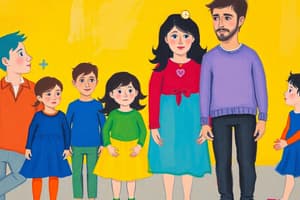Podcast
Questions and Answers
A family teaching their child about their local customs and religious beliefs is primarily fulfilling which function?
A family teaching their child about their local customs and religious beliefs is primarily fulfilling which function?
- Caregiving and cultural transmission.
- Socialization and religious/spiritual. (correct)
- Childrearing only.
- Emotional support only.
What is the PRIMARY focus of the family's childrearing function?
What is the PRIMARY focus of the family's childrearing function?
- Teaching children religious and spiritual practices
- Transmitting cultural values to children.
- Providing financial security to children.
- Ensuring children's social, emotional, and intellectual development. (correct)
Which family function is specifically focused on tending to the needs of elderly or sick members?
Which family function is specifically focused on tending to the needs of elderly or sick members?
- Economic Support
- Socialization
- Caregiving (correct)
- Emotional support
Which family structure is characterized by multiple generations living together?
Which family structure is characterized by multiple generations living together?
What is a family unit that is formed through remarriage or cohabitation, including step-parents and step-children?
What is a family unit that is formed through remarriage or cohabitation, including step-parents and step-children?
Which of the following best describes the shift in gender roles within families over time?
Which of the following best describes the shift in gender roles within families over time?
Which of the following is a characteristic of modern fatherhood, according to the content?
Which of the following is a characteristic of modern fatherhood, according to the content?
What has been a significant change in women's roles in the family since the mid-20th century?
What has been a significant change in women's roles in the family since the mid-20th century?
What makes an adoptive family distinct from a foster family?
What makes an adoptive family distinct from a foster family?
Flashcards
Nuclear Family
Nuclear Family
A family unit made up of parents and their children.
Extended Family
Extended Family
A broader family unit that includes multiple generations, often living together.
Single-Parent Family
Single-Parent Family
A family headed by one parent raising children.
Blended Family
Blended Family
Signup and view all the flashcards
Same-Sex Family
Same-Sex Family
Signup and view all the flashcards
Adoptive Family
Adoptive Family
Signup and view all the flashcards
Foster Family
Foster Family
Signup and view all the flashcards
Kinship
Kinship
Signup and view all the flashcards
Emotional Support in Families
Emotional Support in Families
Signup and view all the flashcards
Socialization in Families
Socialization in Families
Signup and view all the flashcards
Economic Support in Families
Economic Support in Families
Signup and view all the flashcards
Caregiving in Families
Caregiving in Families
Signup and view all the flashcards
Cultural Transmission in Families
Cultural Transmission in Families
Signup and view all the flashcards
Study Notes
Types of Families in Canada
- Families in Canada exhibit diverse structures, moving beyond traditional nuclear models.
- Common types include:
- Nuclear families: parents and their children.
- Extended families: multiple generations living together.
- Single-parent families: one parent raising children.
- Blended families: step-parents and step-children.
- Same-sex families: families headed by same-sex couples.
- Adoptive families: families legally adopting children.
- Foster families: temporary caretakers for children.
- These structures may overlap, reflecting the fluid nature of family dynamics.
Key Terms
- Family: A social group bound by kinship ties, legal obligations, or shared residence.
- Nuclear family: A family unit consisting of parents and their children.
- Extended family: A family unit encompassing multiple generations, often living together.
- Single-parent family: A family unit headed by one parent and their children.
- Blended family: A family unit formed through remarriage or cohabitation, involving step-parents and step-children.
- Same-sex family: A family unit consisting of same-sex parents and dependent children.
- Adoptive family: A family unit where children are legally adopted, becoming part of the kinship group.
- Foster family: A family providing short-term care for children in need.
- Kinship: A social bond based on blood relation, marriage, or adoption.
- Household: A group of people residing in the same dwelling.
Family Roles Change Over Time
- Traditional family roles are less common due to evolving societal norms and expectations.
- Gender roles are being re-evaluated.
- Mothers and fathers increasingly share household responsibilities, childcare, and work.
- Women's increased participation in the workforce has transformed family dynamics since the mid-20th century.
- Men's involvement in childcare is expanding and increasing.
Trends Over Time Regarding Motherhood and Fatherhood
- Women's roles have evolved from primarily homemakers to active participants in the labor force.
- There's an increasing focus on women's economic independence and career advancement.
- Fathers are taking on more active roles in childcare and household chores.
- Modern fatherhood includes a broader definition, emphasizing emotional involvement and shared parenting.
Functions of the Family
- Economic support: Families historically provided economic support but this function is less prominent with rising individual economic self-sufficiency.
- Emotional support: Families provide emotional intimacy and security.
- Childrearing: Families are responsible for raising and educating children, nurturing their social, emotional, and intellectual development.
- Socialization: Families introduce children to social norms, values, and beliefs.
- Caregiving: Providing care for vulnerable family and community members.
- Cultural transmission: Families pass on cultural values, beliefs, and traditions to future generations.
- Religious and spiritual: Families may be instrumental in religious and spiritual practices through shared traditions and beliefs..
Studying That Suits You
Use AI to generate personalized quizzes and flashcards to suit your learning preferences.




